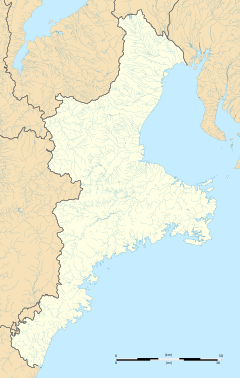Iseshi Station
Iseshi Station 伊勢市駅 | |||||
|---|---|---|---|---|---|
 Iseshi Station, JR side | |||||
| General information | |||||
| Location | 1-1-4 Fukiage, Ise-shi, Mie-ken 516-0073 Japan | ||||
| Coordinates | 34°29′30″N 136°42′35″E / 34.4918°N 136.7098°E | ||||
| Operated by | |||||
| Line(s) | |||||
| Platforms | 1 island + 3 side platforms | ||||
| Other information | |||||
| Website | Official website | ||||
| History | |||||
| Opened | November 11, 1897 | ||||
| Previous names | Yamada (until 1959) | ||||
| Passengers | |||||
| FY2019 | 1260 (JR) 4174(Kintetsu) daily | ||||
| |||||
Iseshi Station (伊勢市駅, Iseshi-eki) is a union passenger railway station located in the city of Ise, Mie Prefecture, Japan, operated by JR Central and the private railway operator Kintetsu Railway.
Lines
[edit]Iseshi Station is served by the JR Sangū Line and is 15.0 rail kilometers from the terminus of theline at Taki Station. The station is also served by the Yamada Line, and is located 27.7 rail kilometers from the starting point of that line at Ujiyamada Station.
Station layout
[edit]Iseshi Station has a single island platform and a side platform serving the 3 tracks used by JR Central. The station is staffed. The Kintetsu portion of the station has two opposed side platforms. JR Central station is responsible for the administration of the section between Tamaru Station and Toba Station. The Kintetsu station is administrated by Ujiyamada Station. All of the platforms are connected by a footbridge.
Platforms
[edit]| 1 | ■ Sangū Line | for Matsusaka, Kameyama, Yokkaichi and Nagoya |
| 2 | ■ Sangū Line | for Futaminoura and Toba |
| 3 | ■ Sangū Line | for Matsusaka, Kameyama, Yokkaichi and Nagoya (partly) for Futaminoura and Toba (partly) |
| 4 | ■ Yamada Line | for Nagoya, Osaka, Kobe and Kyoto |
| 5 | ■ Yamada Line | for Isuzugawa (Naiku-mae), Toba and Kashikojima |
Adjacent stations
[edit]| « | Service | » | ||
|---|---|---|---|---|
| Sangū Line | ||||
| Yamada-Kamiguchi | Local | Isuzugaoka or Terminus | ||
| Taki | Rapid "Mie" (usually) | Futaminoura | ||
| Taki | Rapid "Mie" (stopping every station between Iseshi and Toba; 1
(Weekday), 51 (ex weekday), 15, 17, 4, 6, 8, 10, 24, 26) |
Isuzugaoka | ||
| Miyagawa | Rapid "Mie" 4 for Nagoya | Isuzugaoka | ||
| Yamada-Kamiguchi | Rapid "Mie" 2 starting for Nagoya Rapid "Mie" 19, 21, 23, 25 terminating at Iseshi |
Terminus | ||
| Yamada Line | ||||
| Miyamachi | Local | Ujiyamada | ||
| Matsusaka Miyamachi |
Express | Ujiyamada | ||
| Matsusaka | Rapid Express | Ujiyamada | ||
| Matsusaka | Limited Express | Ujiyamada | ||
| Tsuruhashi (Osaka Line) Tsu (Nagoya Line) |
Non-stop Limited Express | Ujiyamada | ||
| Yamato-Yagi (Osaka Line) Kintetsu-Yokkaichi (Nagoya Line) |
Limited Express "Shimakaze" | Ujiyamada | ||
History
[edit]Iseshi Station opened on November 11, 1897, as Yamada Station (山田駅, Yamada-eki) on the privately owned Sangū Railway. The line was nationalized on October 1, 1907, becoming part of the Japanese Government Railway (JGR) network. The Sangū Electric Express Railway (later known as the Yamada Line) began operations on September 21, 1930.[1] The station building was rebuilt in May 1950, and the Kintetsu portion in 1953. The station was renamed to its present name on July 15, 1959.
Passenger statistics
[edit]In fiscal 2019, the JR station was used by an average of 1260 passengers daily and they Kintetsu station by 4174 passengers daily (boarding passengers only).[2]
Surrounding area
[edit]- Ise Grand Shrine: Outer Shrine
- JR Central Iseshi train depot
See also
[edit]References
[edit]External links
[edit]![]() Media related to Iseshi Station at Wikimedia Commons
Media related to Iseshi Station at Wikimedia Commons
- Kintetsu: Iseshi Station (in Japanese)
- JR Central: Iseshi Station (in Japanese)


